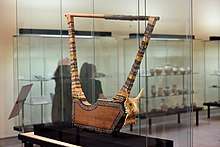
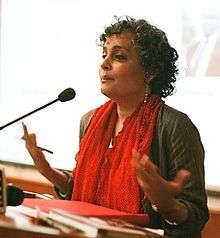
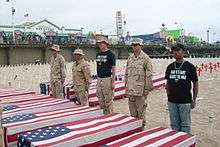

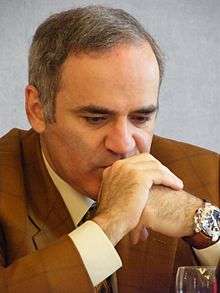
.jpg)
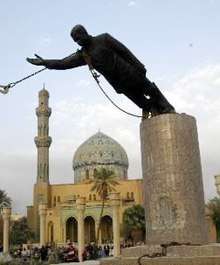
The Iraq War was an armed conflict that began in 2003 with the invasion of Iraq by a U.S.-led coalition that overthrew the regime of Iraqi dictator Saddam Hussein. The conflict continued for much of the next decade as an insurgency emerged to oppose the coalition forces and the new, post-invasion Iraqi government. In the aftermath of the 2003 invasion, Iraq held multi-party elections in 2005.
Quotes
- The White House had concocted a fake letter from Habbush to Saddam, backdated to July 1, 2001. It said that 9/11 ring leader Mohammed Atta had actually trained for his mission in Iraq—thus showing finally that there was an operational link between Saddam and al Qaeda, something the Vice Presidents Office had been pressing CIA to prove since 9/11 as a justification to invade Iraq. There is no link.
- Ron Suskind, The Way of the World; p. 371 [about Bush] <date?>
- The British and American governments are about to destroy all hopes for peace anywhere in our world for ever. This war has already begun.
- Vanessa Redgrave cited in Politicians, human rights activists and celebrities joined millions of ordinary people on the streets of Europe on Saturday to protest against a rush to war with Iraq. These are some of their views at CNN.com, (16 February 2003) Jackson was asked about his views on the build up before the Iraq war. <date?>
- They're not going to like this downtown.
- Then-CIA director George Tenet, upon learning in early 2003 that, in secret meetings between British intelligence and Saddam's intelligence chief, Tahir
- Jalil Habbush, Habbush claimed Iraq had no WMD; Ron Suskind, The Way of the World
- "Downtown" refers to the White House. [about Bush] <date?>
- For several decades, Helen Thomas covered the White House as a reporter for United Press International.... and when the specter of war grew large in 2002, she didn’t hold back. “It’s bombs away for Iraq and on our civil liberties if Bush and his cronies get their way,” Thomas said in early November during a speech at MIT. Looking back on a long
career, she said: “I censored myself for fifty years when I was a reporter.”
- To a certain extent Saddam Hussein's departure was a positive thing. But it also provoked reactions, such as the mobilization in a number of countries, of men and women of Islam, which has made the world more dangerous.
- Jacques Chirac <date?>
- If you look at those matters, you will come to the conclusion that the attitude of the United States of America is a threat to world peace. Because what America is saying is that if you are afraid of a veto in the Security Council, you can go outside and take action and violate the sovereignty of other countries. That is the message they are sending to the world. That must be condemned in the strongest terms."
- On November 8, 2002...National Public Radio’s All Things Considered aired a story by longtime correspondent Tom Gjelten. “A war against Iraq would begin with a bombing campaign, and the resources for that phase of action are largely in place already,” he reported. The tone was reassuring: “Defense officials are confident the U.N. Timeline will not get in their way. For one thing, they’re going ahead in the meantime with war preparations. Says one senior military officer, ‘When the order does come, we have to be ready to rock ’n’ roll.’” It was a notable phrase for a highranking officer at the Pentagon to use with reference to activities that were sure to kill large numbers of people. The comment did not meet with any critical response; none of the news report’s several hundred words offered a perspective contrary to the numbing language that distanced listeners from the human catastrophes of actual war. Such reporting is safe. Chances are slim that it will rankle government sources, news executives, network owners, advertisers or—in the case of “public broadcasting”—large underwriters. While NPR seems more and more to stand for “National Pentagon Radio,” objections from listeners have apparently mattered little to those in charge.
- The option of war can appear initially to be the most rapid. But let us not forget that after winning the war, peace must be built.
- When war, as in these days in Iraq, threatens the fate of humanity, it is ever more urgent to proclaim, with a strong and decisive voice, that only peace is the road to follow to construct a more just and united society. Violence and arms can never resolve the problems of man.
2003
- It is not too late to stop this war. We must march until there is a declaration of peace and reconciliation.
- Jesse Jackson cited in Politicians, human rights activists and celebrities joined millions of ordinary people on the streets of Europe on Saturday to protest against a rush to war with Iraq. These are some of their views at CNN.com, 16 February 2003 Jackson was asked about his views on the build up before the Iraq war.
- We want to say to America: Is it worth it to you? Won't you have have, afterward, decades of hostility in the Islamic world?
- In my opinion, it disrespects the United Nations. It doesn't take into account what the rest of the world thinks. And I think this is serious.
- It was obvious from the beginning that the Bush administration was determined to get rid of Saddam Hussein with or without UN sanction. Mr Bush is determined to do what his father ‘failed’ to do and so prove himself as big as, or bigger than, his father. The people behind him have their eyes on Iraqi oil.
- In all the solemn statements by self-important politicians and newspaper columnists about a coming war against Iraq, and even in the troubled comments by some who are opposed to the war, there is something missing. The talk is about strategy and tactics and geopolitics, and personalities. It is about air war and ground war, about alliances and weapons of mass destruction, and arms inspections, about oil and natural gas, about nation-building and “regime change.”
What is missing is what an American war on Iraq will do to tens of thousands or hundreds of thousands of ordinary human beings who are not concerned with geopolitics and military strategy, and who just want their children to live, to grow up. They are not concerned with “national security” but with personal security, with food and shelter and medical care and peace.
I am speaking of those Iraqis and those Americans who will, with absolute certainty, die in such a war, or lose arms or legs, or be blinded. Or they will be stricken with some strange and agonizing sickness, which will lead to their bringing deformed children into the world (as happened to families in Vietnam, in Iraq, and also in the United States).- Howard Zinn's Introduction to Target Iraq: What the News Media Didn't Tell You, by Norman Solomon, (2003)
- Only rarely has the human story, with names and images, come through as more than a one-day flash of truth, as one day when I read of a ten-year-old boy, named Noor Mohammed, lying on a hospital bed on the Pakistani border, his eyes gone, his hands blown off, a victim of American bombs.
Surely, we must discuss the political issues. We note that an attack on Iraq would be a flagrant violation of international law. We note that the mere possession of dangerous weapons is not grounds for war—otherwise we would have to make war on dozens of countries. We point out that the country that possesses by far the most “weapons of mass destruction” is our country, which has used them more often and with more deadly results than any other nation on earth. We can point to our national history of expansion and aggression. We have powerful evidence of deception and hypocrisy at the highest levels of our government.
But, as we contemplate an American attack on Iraq, should we not go beyond the agendas of the politicians and the experts? (John LeCarré has one of his characters say: “I despise experts more than anyone on earth.”) Should we not ask everyone to stop the high-blown talk for a moment and imagine what war will do to human beings whose faces will not be known to us, whose names will not appear except on some future war memorial?- Howard Zinn in the Introduction to Target Iraq: What the News Media Didn't Tell You, by Norman Solomon, (2003)
- It is our challenge and responsibility to sort through the propaganda of selective facts, distortions, and images in search of truth. When a country goes on a war track, stepping out of line is always hazardous. All kinds of specious accusations fly. Whether you travel to Baghdad or hold an anti-war sign on Main Street back home, some people will accuse you of serving the propaganda interests of the foreign foe. But the only way to prevent your actions from being misconstrued is to do nothing. The only way to avoid the danger of having your words distorted is to keep your mouth shut. In the functional category of “use it or lose it,” the First Amendment remains just a partially realized promise. To the extent that it can be fulfilled, democracy becomes actual rather than theoretical. But that requires a multiplicity of voices. And when war demands our silence, the imperative of dissent becomes paramount. We need to hear factual information and not let it be drowned out by the drumbeat of war. We need to think as clearly as possible. And we need to listen to our own hearts. When his visit to Iraq began, Sean Penn expressed the desire “to find my own voice on matters of conscience.” In the near future, each of us will have that opportunity.
- But tarring the Blix-led inspection mission ranked as a high priority for war enthusiasts on the Bush team who were eager to pressure Blix into becoming more confrontational with the Iraqi government and perhaps to lay groundwork for discounting his future reports to the Security Council. Key rightwing media voices were warbling from the same songbook. “We hope that as the days unfold Mr. Blix understands that his own credibility is as much on the line as Saddam Hussein’s,” the Wall Street Journal editorialized on November 22, adding darkly that “Mr. Blix has his own track record in Iraq, and it doesn’t inspire confidence that he will go to the mat to disarm the dictator. The question now is whether the seventy-four-year-old Swedish diplomat is going to let Saddam make a fool of him and the U.N. one more time.” The Journal’s editorial page, often the source of opening salvos that quickly resound in the national media echo chamber, was just getting started. Two editions later, a long top-of-thepage attack appeared under the headline “Hans the Timid.” As if to be graphic about Blix’s dubious character, the drawing that accompanied the op-ed article showed him wearing a tie with a peace sign on it
- Many of your actions to date and those proposed seem to violate every defining principle of this country over which you preside; intolerance of debate (“with us or against us”), marginalization of your critics, the promoting of fear through unsubstantiated rhetoric, manipulation of a quick comfort media, and the position of your administration’s deconstruction of civil liberties all contradict the very core of the patriotism you claim. You lead, it seems, through a bloodlined sense of entitlement. Take a close look at your most vehement media supporters. See the fear in their eyes as their loud voices of support ring out with that historically disastrous undercurrent of rage and panic masked as “straight tough talk.” How far have we come from understanding what it is to kill one man, one woman, or one child, much less the “collateral damage” of many hundreds of thousands. Your use of the words “this is a new kind of war” is often accompanied by an odd smile. It concerns me that what you are asking of us is to abandon all previous lessons of history in favor of following you blindly into the future. It worries me because with all your best intentions, an enormous economic surplus has been squandered. Your administration has virtually dismissed the most fundamental environmental concerns and therefore, by implication, one gets the message that, as you seem to be willing to sacrifice the children of the world, would you also be willing to sacrifice ours.
- Sean Penn's Open Letter to the President of the United States of America (G.W.Bush), which ran as an advertisement in the Washington Post on October 18, 2002 & republished in the Afterword of Target Iraq: What the News Media Didn't Tell You, p.118 (2003)
- Why don't they ask [Saddam's intelligence chief, Tahir Jalil Habbush] to give us something we can use to help us make our case [to link 9/11 and Saddam]?
- George W. Bush, from Ron Suskind, The Way of the World, p. 364, on Bush's frustration at the results of secret meetings between British intelligence and Saddam's intelligence chief, Tahir Jalil Habbush [by Bush, 2003]
- It's an intelligence document written by the then head of Iraqi intelligence, Habbush to Saddam. It's dated the 1st of July, 2001. And it‘s basically a memo saying that Mohammed Atta has successfully completed a training course at the house of Abu Nidal, the infamous Palestinian terrorist, who, of course, was killed by Saddam a couple of months later. Now, this is the first, really, concrete proof that al Qaeda was working with Saddam. It‘s a very explosive development
About 2003
- The invasion didn’t take a toll only on Iraq’s movable artifacts; it also damaged the archeological sites from which such artifacts emerge. “It’s mostly the sites in the south that were damaged in the immediate aftermath of the invasion,” said Elizabeth Stone, an archeologist who used high-resolution satellite imagery to compare the damage to sites right before and after the invasion. Her data showed a sudden “massive devastation:” Of 1,457 southern sites examined, 13 percent had already been looted prior to the invasion, by February 2003—but that proportion rose to 41 percent by the end of the year. Sites containing relics of temples and palaces, like Umma and Umm Al-Aqarib, were far removed from governmental oversight, “so lots of people just went off and dug holes,” she said.
- Sigal Samuel, “It’s Disturbingly Easy to Buy Iraq’s Archeological Treasures”, The Atlantic, (Mar 19, 2018)
Looting of the National Museum of Iraq (April 2003)
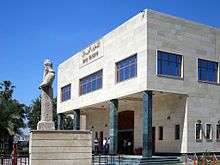
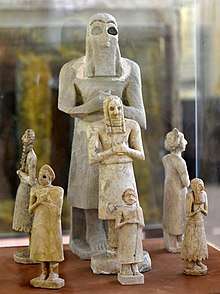
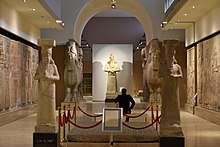
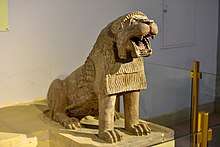
- The speed with which the Coalition forces achieved victory over the Iraqi military contributed to a swift collapse of the security system that had previously existed in Iraq to curb looting. There were not enough Coalition troops in Baghdad to deal with remaining pockets of resistance and simultaneously control the looting. As a result, the "U.S. Army initially allowed the looting to continue unchecked." Looting extended beyond Baghdad to hundreds of archaeological sites throughout the whole of Iraq. The United States and Coalition forces simply did not have enough personnel to adequately protect all of them.
- Gregory J. Ferrara, “Museum Treasures in the Fog of War: a Historical Analysis of Cultural Heritage Protection During a Time of War”, Seton Hall University, (Spring 5-2013), pp. 37-38.
- Many Iraqis complied with the gentle pressure of JIACG agents once they realized that thy were benefiting their won cultural heritage and would not be viewed as criminals. As of September 2010, repatriation operations begun by the JIACG have recovered "roughly half" of fifteen thousand artifacts that had been looted from the Iraq Museum collection.
- Gregory J. Ferrara, “Museum Treasures in the Fog of War: a Historical Analysis of Cultural Heritage Protection During a Time of War”, Seton Hall University, (Spring 5-2013), pp. 38-39.
- The expedient fall of Baghdad was a signal to Coalition commanders that the network-centric style of warfare adopted by the U.S. military had achieved victory. Yet the looting of the Iraq Museum still resonates as a defeat.
- Gregory J. Ferrara, “Museum Treasures in the Fog of War: a Historical Analysis of Cultural Heritage Protection During a Time of War”, Seton Hall University, (Spring 5-2013), p. 48.
- American academics that convened in 1943 to address the war effort made their assessments eight months before the Allied invasion of Italy and eighteen months before the invasion of France. In comparison, academic meetings with the Pentagon occurred less than three months prior to the Iraq War. A wider window of time is needed to prepare guidelines that consider I environmental and cultural conditions soldiers are expected to encounter in a specified theatre of war.
- Gregory J. Ferrara, “Museum Treasures in the Fog of War: a Historical Analysis of Cultural Heritage Protection During a Time of War”, Seton Hall University, (Spring 5-2013), p. 51.
- All the looting at Baghdad's Iraq Museum had taken place by the time U.S. troops—engaged in toppling Saddam Hussein—arrived to protect it, on April 16, 2003. Between April 8, when the museum was vacated, and April 12, when the first of the staff returned, clubs in hand, thieves had plundered an estimated 15,000 items, many of them choice antiquities: ritual vessels, heads from sculptures, amulets, Assyrian ivories and more than 5,000 cylinder seals.
The looting proved less extensive than the early reports of 170,000 stolen artifacts, but the losses were nonetheless staggering. "Every single item that was lost is a great loss for humanity," says Donny George Youkhanna, the former director general of Iraqi museums, now a visiting professor at the State University of New York at Stony Brook. "It is the only museum in the world where you can trace the earliest development of human culture—technology, agriculture, art, language and writing—in just one place."- Robert M. Poole, “Looting Iraq”, Smithsonian Magazine, (February 2008).
- While destruction and looting of cultural heritage has been a by-product of war for thousands of years, the scale of the looting of the Iraq Museum was staggering. Particularly frustrating were the neglected warnings that such an incident could happen, and the immediate response from the Bush administration that “stuff happens”.
- The University of Sydney, “Iraq museum looting: 15 years on”, (10 April 2018).
- In the chaotic, violent April of 2003, as US tanks rolled into Baghdad, the Iraq Museum was broken into and pillaged. Looters rampaged through the halls, storerooms, and cellars, stealing more than 15,000 precious objects.
"It was terrible. You didn't want to believe it," says Iraqi archaeologist Lamia al-Gailani, who worked for many years at the museum before moving to London.
"Especially hearing about objects that you know, and then people start saying they've gone - it was a shock."- Kanishk Tharoor and Maryam Maruf ,“Museum of Lost Objects: Looted Sumerian Seal”, BBC News,(11 March 2016).
- Lamia al-Gailani says her Arab friends had trouble accepting that Baghdadis may have been responsible for looting their own treasures.
"Everyone had their own theory of who looted the museum," she says. "It depended on who they don't like. Was it the Americans? Was it the Israelis? Was it the Kuwaitis? It was very funny, but also sad that they never, never accused the actual people in Baghdad of looting."- Kanishk Tharoor and Maryam Maruf ,“Museum of Lost Objects: Looted Sumerian Seal”, BBC News,(11 March 2016).
Target Iraq: What the News Media Didn't Tell You, Norman Solomon & Reese Erlich (2003)
2004
- The invasion of Iraq will surely go down in history as one of the most cowardly wars ever fought. It was a war in which a band of rich nations, armed with enough nuclear weapons to destroy the world several times over, rounded on a poor nation, falsely accused it of having nuclear weapons, used the United Nations to force it to disarm, then invaded it, occupied it, and are now in the process of selling it.
I speak of Iraq, not because everybody is talking about it, (sadly at the cost of leaving other horrors in other places to unfurl in the dark), but because it is a sign of things to come. Iraq marks the beginning of a new cycle. It offers us an opportunity to watch the Corporate-Military cabal that has come to be known as 'Empire' at work. In the new Iraq the gloves are off.
As the battle to control the world's resources intensifies, economic colonialism through formal military aggression is staging a comeback. Iraq is the logical culmination of the process of corporate globalization in which neo-colonialism and neo-liberalism have fused. If we can find it in ourselves to peep behind the curtain of blood, we would glimpse the pitiless transactions taking place backstage. But first, briefly, the stage itself.
- Before Washington’s illegal invasion of Iraq, a Gallup International poll showed that in no European country was the support for a unilateral war higher than 11 percent. On February 15, 2003, weeks before the invasion, more than ten million people marched against the war on different continents, including North America. And yet the governments of many supposedly democratic countries still went to war. The question is: is “democracy” still democratic? Are democratic governments accountable to the people who elected them? And, critically, is the public in democratic countries responsible for the actions...?
- Audience Member: Negrodamus, why is President Bush convinced there are weapons of mass destruction in Iraq?
- Negrodamus: Because he has the receipt.
- Paul Mooney, Chappelle's Show, season 2, ep. 2, (January 28, 2004).
- The option of war can appear initially to be the most rapid. But let us not forget that after winning the war, peace must be built.
- Cronyism and corruption are major factors in Iraq's downward spiral.
- Paul Krugman, "What Went Wrong?", New York Times (April 23, 2004)
Arundhati Roy in her 2004 Sydney Peace Prize lecture, University of Sydney, (4 November 2004)
- The invasion of Iraq will surely go down in history as one of the most cowardly wars ever fought. It was a war in which a band of rich nations, armed with enough nuclear weapons to destroy the world several times over, rounded on a poor nation, falsely accused it of having nuclear weapons, used the United Nations to force it to disarm, then invaded it, occupied it...
- Iraq marks the beginning of a new cycle. It offers us an opportunity to watch the Corporate-Military cabal that has come to be known as 'Empire' at work...As the battle to control the world's resources intensifies, economic colonialism through formal military aggression is staging a comeback. Iraq is the logical culmination of the process of corporate globalization in which neo-colonialism and neo-liberalism have fused.
- If we can find it in ourselves to peep behind the curtain of blood, we would glimpse the pitiless transactions taking place backstage. But first, briefly, the stage itself. In 1991 US President George Bush senior mounted Operation Desert Storm... Half a million Iraqi children died because of the regime of economic sanctions in the run up to Operation Shock and Awe. Until recently, while there was a careful record of how many US soldiers had lost their lives, we had no idea of how many Iraqis had been killed. US General Tommy Franks said "We don't do body counts" (meaning Iraqi body counts). He could have added "We don't do the Geneva Convention either."
- A new, detailed study, fast-tracked by the Lancet medical journal and extensively peer reviewed, estimates that 100,000 Iraqis have lost their lives since the 2003 invasion. That's one hundred halls full of people - like this one. That's one hundred halls full of friends, parents, siblings, colleagues, lovers...like you. The difference is that there aren't many children here today let's not forget Iraq's children. Technically that bloodbath is called precision bombing. In ordinary language, it's called butchering,
- So the 'civilized' 'modern' world - built painstakingly on a legacy of genocide, slavery and colonialism - now controls most of the world's oil. And most of the world's weapons, most of the world's money, and most of the world's media. The embedded, corporate media in which the doctrine of Free Speech has been substituted by the doctrine of Free If You Agree Speech.
- The UN's Chief Weapons Inspector Hans Blix said he found no evidence of nuclear weapons in Iraq. Every scrap of evidence produced by the US and British governments was found to be false - whether it was reports of Saddam Hussein buying uranium from Niger, or the report produced by British Intelligence which was discovered to have been plagiarized from an old student dissertation. And yet, in the prelude to the war, day after day the most 'respectable' newspapers and TV channels in the US, headlined the 'evidence' of Iraq's arsenal of weapons of nuclear weapons.
- What does peace mean to the poor who are being actively robbed of their resources and for whom everyday life is a grim battle for water, shelter, survival and, above all, some semblance of dignity? For them, peace is war.
- We know very well who benefits from war in the age of Empire. But we must also ask ourselves honestly who benefits from peace in the age of Empire? War mongering is criminal. But talking of peace without talking of justice could easily become advocacy for a kind of capitulation. And talking of justice without unmasking the institutions and the systems that perpetrate injustice, is beyond hypocritical.
- It's easy to blame the poor for being poor. It's easy to believe that the world is being caught up in an escalating spiral of terrorism and war. That's what allows the American President to say "You're either with us or with the terrorists." But we know that that's a spurious choice. We know that terrorism is only the privatization of war. That terrorists are the free marketers of war. They believe that the legitimate use of violence is not the sole prerogative of the State.
- It is mendacious to make moral distinction between the unspeakable brutality of terrorism and the indiscriminate carnage of war and occupation. Both kinds of violence are unacceptable. We cannot support one and condemn the other.
2005
- Saddam is gone. It's a good thing, but I don't agree with what was done. It was a big mistake. The American government made several errors, one of which is how easy it would be to get rid of Saddam and how hard it would be to unite the country.
2006
- [T]here is no longer a preponderance of military force that allows the West to impose its will, the U.S. defeat in Iraq being the most extraordinary illustration of that fact.
- Jean Bricmont (2006), Humanitarian Imperialism, Monthly Review Press, p. 14.
- I like to tell people when the final history is written on Iraq, it will look like just a comma because there is — my point is, there's a strong will for democracy.
- George W. Bush cited in Dismisses Bloodshed In Iraq As 'Just A Comma' at crooksadillers 23 September, 2006: Bush was asked if Iraq on the verge of a civil war.
- British and US forces fired about 320 tonnes of depleted uranium munitions in the 1991 Gulf war and may have used up to 2000 tonnes in the 2003 invasion of Iraq. Because of its extreme density it is used to make the tips of armour piercing shells.
Reports from southern Iraq have documented a steep rise in the incidence of cancers since the 1990s, especially cases in children.- Owen Dyer, “WHO suppressed evidence on effects of depleted uranium, expert says”, BMJ. 2006 Nov 11; 333(7576): 990.
2007
- Who will demand accountability for the failure of our national political leadership involved in the management of this war? They have unquestionably been derelict in the performance of their duty. In my profession, these types of leaders would immediately be relieved or court martialed.
- Lt. Gen. Ricardo Sanchez, 10-12-07, .
- The true number of civilian dead in Iraq has now exceeded 800,000, while wounded, to a greater or lesser degree, amount to at least one million. For how much longer can the occupying powers hide these figures from their people? It goes without saying that every effort is made by these powers to hide and diminish, for their own purposes, these appalling statistics of destruction. It is no wonder, therefore, that millions of Iraqis have fled their country. Is it surprising that soon the invasion of Iraq will be recognized as the greatest disaster of recent times: unlawful, unnecessary, and arrogant in the extreme?
- Benjamin Creme in Transformation, Share International (June 2007)
2008
- As I have heard Bush say, only a wartime president is likely to achieve greatness, in part because the epochal upheavals of war provide the opportunity for transformative change of the kind Bush hoped to achieve. In Iraq, Bush saw his opportunity to create a legacy of greatness.
- Scott McClellan, What Happened (2008), pp. 131. (on Bush's need to be a wartime president to improve the chance of a "great" legacy)
- In this case, the 'liberal media' didn't live up to its reputation. If it had, the country would have been better served.
- Scott McClellan, What Happened (2008)
- As a Texas loyalist who followed Bush to Washington with great hope and personal affection and as a proud member of his administration, I was all too ready to give him and his highly experienced foreign policy advisers the benefit of the doubt on Iraq. Unfortunately, subsequent events have showed that our willingness to trust the judgment of Bush and his team was misplaced.
- Scott McClellan, What Happened (2008)
- [Habbush] tells us there are no WMDs. He tells us Saddam's mindset, that he's afraid of the Iranians more than us, afraid of being showed to be a toothless tiger. That is something we ignore.
- Ron Suskind, on meetings between British intelligence and Saddam Hussein's intelligence chief, Tahir Jalil Habbush, demonstrating Saddam's claim in jail years later that he didn't disclose his lack of WMDs for fear of Iran's perception of Iraq is not the first time the U.S. learned of it, on The Daily Show; August 11, 2008.
- Stewart: And the letter says literally in it Mohammad Atta did train in Iraq, and the uranium thing. Did anyone think it was weird that the letter combined the two things that were in question, that in the letter it said, Oh, and he did buy uranium from Niger...?
Suskind: … It was an overreach moment. The letter popped up. Tom Brokaw did it on Meet the Press. William Safire writes about it. A couple days in, about a week in, people are just like, Geez, it's an awful lot in one letter. And that overreach kind of revealed it to be fraudulent.
Stewart: Why didn't anyone pursue it at that time, the fraudulent nature of it? Why did that just fall away?
Suskind: It was hard to get at. It's a closely held thing, and this is an operation through the CIA. You need someone who's going to stand up in daylight and say, Hey, this is what happened.
Stewart: Your source in the CIA, Richard?
Suskind: He's one of the folks.
Stewart: He now says, I never said that; I was just kidding around. What's the situation with that?
Suskind: He's a good guy. All the [sources] involved here are good guys, walking around with a kind of lump in their chest for awhile. I'm sympathetic to all the sources. They're under a lot of pressure. In this particular part of the book, there are a lot of disclosures, but this one, the White House is obviously intensely interested in, since there may be illegality that has constitutional consequences.
Stewart: That is maybe the nicest way of saying "impeachment" I think I've ever heard in my life.- Ron Suskind, on CIA involvement in the fraudulent letter by Tahir Habbush claiming a link between Iraq, Atta, and Niger uranium, on The Daily Show; August 11, 2008
2010
- Take the president’s mention of Mosul. It is a city in Iraq, and the Americans who died there and in other Iraqi cities died because of the criminality of President George W. Bush and Vice President Dick Cheney, who manufactured a criminal war of aggression against Iraq, a country that posed no threat to the US. They died too because of the cowardice and venality of the Democrats in Congress who allowed themselves to be bullied and extorted into supporting that criminal war. The five thousand Americans who died, and the hundreds of thousands more who have been gravely wounded in that war, not to mention the more than a million who fought there or worked in support roles for others who fought, were not defending any of our “cherished ideals.” They were simply helping oil companies like Exxon/Mobil, Chevron, Shell and yes, British Petroleum, secure control of the Iraqi oilfields. They were simply helping Bush and Cheney win re-election. They were simply helping inflate the profits of Halliburton, Boeing, Lockheed and Blackwater. Noble deaths indeed.
- Dave Lindorff, The Glorification of War (May 31, 2010), CounterPunch.
- I woke up in the middle of the night with the sound of heavy explosion. It was deep at night. I do not remember what time it was. I just remember the sound was so heavy and so very shocking. Everything in my room was shaking -- my heart, my windows, my bed, everything. I looked out the windows and I saw a full half-circle of explosion. I thought it was just like the movies, but the movies had not conveyed them in the powerful image that I was seeing full of bright red and orange and gray, and a full circle of explosion. And I kept on staring at it until it disappeared. I went back to my bed, and I prayed, and I secretly thanked God that that missile did not land on my family's home, that it did not kill my family that night. Thirty years have passed, and I still feel guilty about that prayer, for the next day, I learned that that missile landed on my brother's friend's home and killed him and his father, but did not kill his mother or his sister. His mother showed up the next week at my brother's classroom and begged seven-year-old kids to share with her any picture they may have of her son, for she had lost everything.
- Zainab Salbi, Zainab Salbi: Women, wartime and the dream of peace, speech at TEDGlobal 2010, TED.
- I grew up in war-torn Iraq, and I believe that there are two sides of wars and we've only seen one side of it. We only talk about one side of it. But there's another side that I have witnessed as someone who lived in it and someone who ended up working in it.
- Zainab Salbi, Zainab Salbi: Women, wartime and the dream of peace, speech at TEDGlobal 2010, TED.
- I grew up with the colors of war -- the red colors of fire and blood, the brown tones of earth as it explodes in our faces and the piercing silver of an exploded missile, so bright that nothing can protect your eyes from it. I grew up with the sounds of war -- the staccato sounds of gunfire, the wrenching booms of explosions, ominous drones of jets flying overhead and the wailing warning sounds of sirens. These are the sounds you would expect, but they are also the sounds of dissonant concerts of a flock of birds screeching in the night, the high-pitched honest cries of children and the thunderous, unbearable silence. "War," a friend of mine said, "is not about sound at all. It is actually about silence, the silence of humanity." [...] I have learned not only that the colors and the sounds of war are the same, but the fears of war are the same. You know, there is a fear of dying.
- Zainab Salbi, Zainab Salbi: Women, wartime and the dream of peace, speech at TEDGlobal 2010, TED.
2014
- These are not just geopolitical fights based on principle, but these fights are based on real material realities, real material advantages. So you look at the routes of these various pipelines that are being proposed and actually built to bring natural gas from Central Asia to the European markets. Turkey felt that it was in their interest to make sure that they can influence the best deal possible that will allow them to be positioned to take full advantage of these pipelines. That's one of the reasons many people argue that Syria had to go: that when there were proposals to run these natural gas pipelines from Iran through Iraq and through Syria, that it was a direct threat to some of the ambitions that Erdogan has for Turkey.
- Ajamu Baraka in Kevin Barrett (October 17, 2014). "Ajamu Baraka & Ibrahim Soudy on ISIS & 9/11 deceptions — on Kevin Barrett's Truth Jihad Radio". No Lies Radio (Podcast). Event occurs at 10:00. Retrieved
- Barack Obama became the fourth consecutive U.S. president to order air strikes in Iraq.
President George Bush went into Iraq in 1991 during the Gulf War under the auspices of a U.N. Security Council resolution against the Iraqi invasion of Kuwait and with a resolution authorizing the use of military force (AUMF) from Congress. In the late 1990s, President Bill Clinton ordered airstrikes in Iraq in 1998, claiming Saddam Hussein had been thwarting U.N. weapons inspectors, sans Congressional authorization, arguing the strikes were a temporary measure covered by the War Powers Act. In 2003, under the pretext of problems with the treatment of U.N. weapons inspectors and using multiple U.N. Security Council resolutions to justify the action, President George W. Bush ordered an invasion of Iraq. He, too, had an AUMF, pinned on U.N. Security Council resolutions worried about weapons of mass destruction (WMD). Last year President Obama reinserted the U.S. military into Iraq to combat ISIS.
- Ed Krayewski, "Four Reasons Bombing ISIS in Syria Isn't Well Thought-Out", Reason (23 September 2014).
2016
- [I]t's very popular to criticize Bush today, Bush 43. Especially for the Iraq invasion, and I’ve heard many voices, even within the Republican Party, it’s just floating with the popular trend. First of all, I have to say as somebody who was born and raised in a Communist country, I cannot criticize any action that led to the destruction of dictatorship.
- Garry Kasparov, Interview with Bill Kristol (April 2016)
2017
- Similar ferocity marked the Marine assaults against the Iraqi city of Fallujah in 2004. Eighteen thousand of the city’s 39,000 buildings were damaged or destroyed. More than 120 Americans and thousands of Iraqi civilians and insurgents died. Had it not been for modern medical techniques, about as many Americans would have been killed in Fallujah as in Hue. And over a decade later, it has taken 100,000 Iraqi forces (to include the Kurdish peshmerga soldiery) a year to kill or drive out the estimated 5,000 terrorists called ISIS from Mosul. Undoubtedly the toll, if ever accurately assessed, will be much higher than in Hue of 1968.
- Bing West, “Urban Warfare, Then and Now”, The Atlantic, (Jun 30, 2017).
2018
- But even aside from looting, some of the Iraqi artifacts that stayed in the country were badly damaged by the U.S. invasion. The Babylonians’ famous Ishtar Gate, built in 575 BC south of Baghdad and excavated in the early 1900s, offers a stark example. In 2003, U.S. forces established a military camp right in the middle of the archeological site. A 2004 study by the British Museum documented the “extremely unfortunate” damage this caused. About 300,000 square meters were covered with gravel, contaminating the site. Several dragon figures on the Ishtar Gate were damaged. Trenches were cut into ancient deposits, dispersing brick fragments bearing cuneiform inscriptions. One area was flattened to make a landing pad for helicopters; another made way for a parking lot; yet another, portable toilets.
- Sigal Samuel, “It’s Disturbingly Easy to Buy Iraq’s Archeological Treasures”, The Atlantic, (Mar 19, 2018)
- On April 9, 2003, television networks across the globe cut to a live scene unfolding in Baghdad’s Firdos Square. A motley hybrid of what appeared to be ordinary Iraqis and uniformed U.S. troops — who had begun to occupy Baghdad — pulled down a massive statue of Saddam Hussein. It was a brilliant, semi-staged propaganda exercise meant to reinforce the neoconservative promise that ordinary Iraqis would be exuberant over the fall of the regime and welcome the U.S. troops as liberators. It was with this image firmly tattooed on the public consciousness of the war that George W. Bush stepped off a fighter plane onboard the USS Abraham Lincoln on May 1, 2003, ridiculously dressed in a flight suit, and told the world that the American mission was accomplished. There was a massive banner with that message created just for that moment. In reality, this particular war was just beginning and it continues on to this day. It is important to examine what happened in this war and how it happened: the lies, the crimes, the mass killings, the destruction — all of it. George W. Bush, Dick Cheney, and the neoconservatives should all hold a special place in the hall of shame for mass killers for what they did to Iraq. But they did it with the support of many in Congress, including some of the most prominent and elite Democrats, including the 2016 nominee for president, Hillary Clinton.
- President George W. Bush would have ordered the war even without the United Nations presentation, or if Secretary Powell had failed miserably in giving it. But the secretary’s gravitas was a significant part of the two-year-long effort by the Bush administration to get Americans on the war wagon. That effort led to a war of choice with Iraq — one that resulted in catastrophic losses for the region and the United States-led coalition, and that destabilized the entire Middle East.
- As I look back at our lock-step march toward war with Iraq, I realize that it didn’t seem to matter to us that we used shoddy or cherry-picked intelligence; that it was unrealistic to argue that the war would “pay for itself,” rather than cost trillions of dollars; that we might be hopelessly naïve in thinking that the war would lead to democracy instead of pushing the region into a downward spiral.
The sole purpose of our actions was to sell the American people on the case for war with Iraq. Polls show that we did. Mr. Trump and his team are trying to do it again. If we’re not careful, they’ll succeed.
